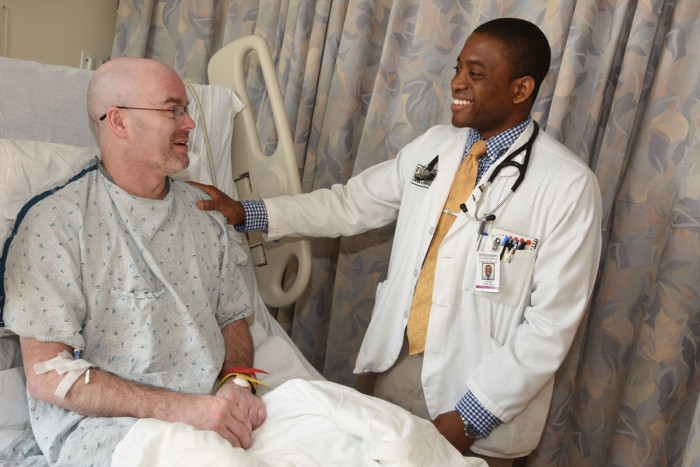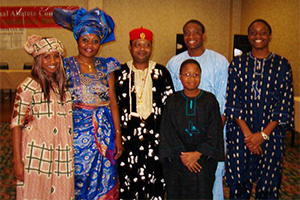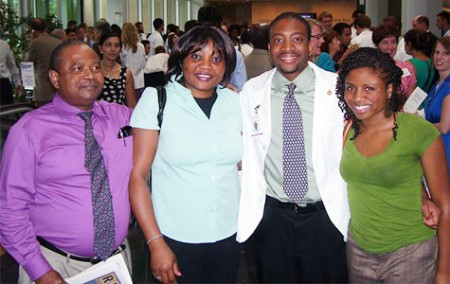Uzoh Ikpeama
Fourth-year medical student Uzoh Ikpeama reflects on choosing a specialty, increasing diversity in medical fields, and the next step in his journey
 Robert Boston
Robert BostonFourth-year medical student Uzoh Ikpeama checks on a patient, William Gaines of St. Louis, at Barnes-Jewish Hospital. Ikpeama, who was on a rotation at BJH, said he has learned a great deal interacting with patients at the hospital and St. Louis’ VA Medical Centers.
Uzoh Ikpeama, a soon-to-be physician in his fourth year at Washington University School of Medicine, knew when he started college that he wanted to have a career in health care.
Ikpeama, who is from Houston, grew up seeing his parents go to work and come home in scrubs every day. His father is a nurse, and his mother just earned her nurse practitioner doctorate.
“From a very young age, I thought medicine was cool,” he said. “It was something I really wanted to do growing up. They always seemed really content when they got home, like they really enjoyed their jobs and were making a huge impact. I wanted to make an impact when I got into the workforce, too.”
Having played football and basketball in high school — and in sports-loving Texas, at that — Ikpeama found himself interested in sports-related medicine. When he entered college at the University of Pittsburgh, he had in mind athletic training or some sort of field involving muscles and joints.
He became intrigued with physical rehabilitation when he heard a speaker talk about the experiences and challenges people with disabilities have with the health-care system.
“It caught me off guard,” Ikpeama recalled. “It was interesting to learn about what they had to go through and the challenges they had. I saw it as an area where a lot of improvements could be made and I could make a difference.”
Ikpeama recently submitted his applications for residency. He wants to specialize in physical medicine and rehabilitation.

Tell us more about your upbringing and your family history.
I was born and raised in Houston, but my parents came to the United States from Nigeria in the mid-1980s, mainly for the economic opportunities and to start a family. My older sister, two younger brothers and I were born in Houston, which has a fairly large Nigerian population. This was nice because even though all of my other relatives remain overseas, I was able to keep a lot of my Nigerian culture growing up. I’ve been back to Nigeria several times to visit relatives, and it is always a good reminder of the opportunities we have here in the U.S. for advancement through hard work and perseverance.
What solidified your decision to pursue rehab?
I always had it in the back of my mind, but in my third year of medical school here, I did a rotation at The Rehabilitation Institute of St. Louis. I really enjoyed my time there and decided on rehab for sure at that point.
How were the other clinical experiences during your third year?
I really enjoyed internal medicine. I had four weeks at Barnes-Jewish Hospital (BJH) in a general medicine rotation. It’s a pretty amazing hospital that gets patients from a wide area so you get to see a lot of unique patient cases that I don’t think you’d see in a smaller city at a smaller hospital. When other hospitals get cases that are very out of the ordinary, they often end up sending them to BJH.
In my third year, I had four weeks at the VA Medical Center on North Grand Boulevard, and this year I did four more weeks at the location on Jefferson Barracks Drive. Both experiences were pretty special. You get to talk to patients and hear what they’ve gone through and how they have different perspectives on their diseases based on their life experiences, particularly if they’ve served overseas and had life-threatening experiences. It was valuable to hear those different perspectives.
What’s been most rewarding during your time as a medical student?
At the hospital, you meet a wide range of people. By the end of third year, you have a much better understanding of the patient-physician interaction and the role you play with patients. You’re a lot more comfortable building these relationships as opposed to just treating them as a person who’s sick and who needs to get better. You get to know patients on a more personal level.
Oftentimes after talking with a patient, you’ll be worried about something that’s going on with him or her — but that person’s concern may be something completely different. Balancing what the patient feels is wrong versus what you feel is wrong and where to start and end treatment is kind of like a give-and-take relationship.
What sort of volunteer work have you done outside of school?
The first couple of years here you have more time on your hands, so I tried a lot of different things. The summer after my first year I became involved in a group that participated in Clinton Global Initiative University, which advocates solving pressing global challenges. Our group worked with barbers in St. Louis to see if they would feel comfortable counseling African-American men about metabolic disease, particularly risk factors such as obesity, diabetes, high blood pressure and high cholesterol. Right now we’re working on getting our manuscript about the project published.
I also was heavily involved with the Student National Medical Association (SNMA). I would offer health screenings with other SNMA members at grocery stores. What was really surprising was that some people walk around with really high blood pressure and sugar levels. There were even a few times we told people to go to the emergency room, and they had no idea they were in need of medical treatment. A lot of things spiral out of control without people knowing.
Having these experiences at such an early point in my medical career has really opened my eyes to how little people might realize what’s going on in their bodies if there aren’t overt signs. It’s also taught me how to counsel patients on these issues.

Do you have thoughts on how to increase diversity in the field of medicine?
I would say a lot of it has to do with resources. Applying for medical school and taking the necessary tests costs a lot of money. Even right now I’m kind of struggling as I apply for residencies – board exams, applications, plane flights to interviews, hotels and things like that add up to thousands of dollars. So I think a lot of people who aren’t in an immediate position to deal with such expenses turn toward more affordable options, even though medicine might be the right field for them.
Another barrier is that if no one around you is involved in science or research or going to college, then I think the chances of you doing those things are slim. I think it’s important to get kids of all races and economic backgrounds exposed at a very early age to people in the health-care system, people with science backgrounds and people doing cool research. That’s one of the main focuses of HPREP, the Health Professions Recruitment and Exposure Program.
Have you been involved with HPREP?
I participated in it through my first and second years of medical school. It’s a student group that goes to high schools and mentors at-risk kids. We rotate them through different stations. At one station, for example, we teach them about the anatomy of the heart or lungs. Then we teach them about physiology and then pathology. Along the way there are always important messages like: “Don’t smoke, or this happens to your lungs,” and “Exercise and don’t eat poorly, or this happens to your heart.”
I think the program does a good job reaching at-risk kids who may not be exposed to much science. They see medical students doing really cool things, and it kind of empowers them and gets them thinking, “Hey, maybe this is something I can do once I finish school. Maybe I should work a little harder in class so I can go to medical school and learn about all these cool things.”
Have you enjoyed your time in St. Louis?
It’s been a fun four years getting to know the city and its people. I’ve been to Shakespeare plays in Forest Park, lots of free concerts in the summer, the balloon glow, the Arch, City Museum – a lot of the St. Louis attractions you have to do while you’re here.







